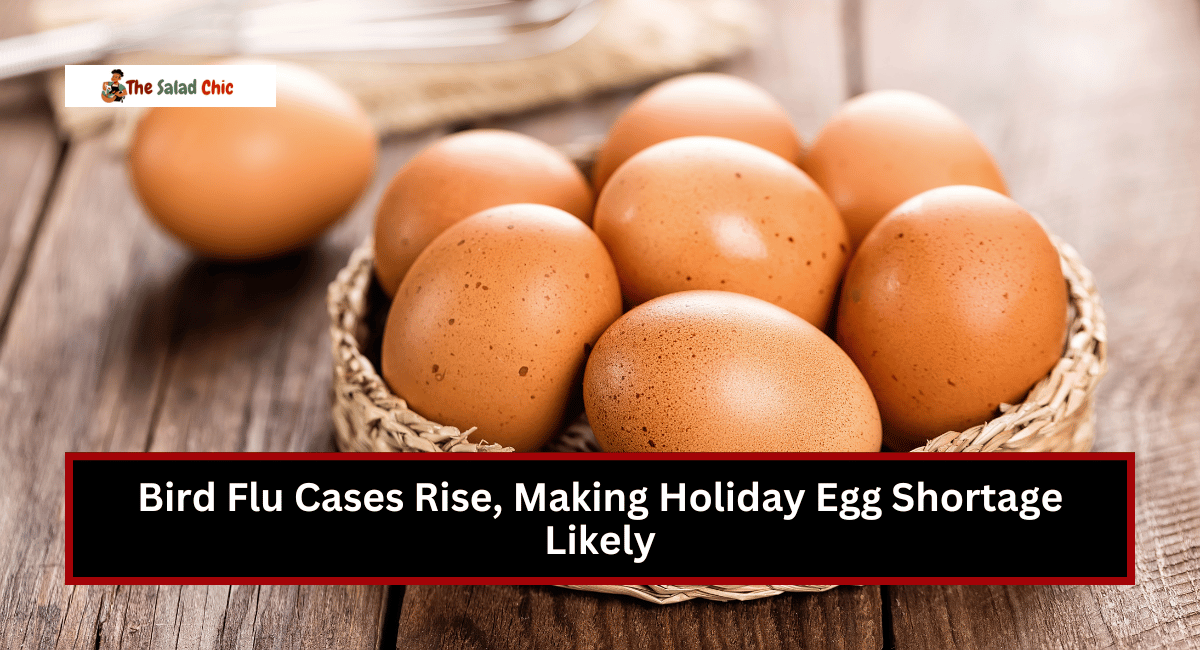As the holiday season approaches, many people plan their festive meals, which often include delicious egg-based dishes like cookies, cakes, and breakfasts. However, this year, shoppers may need more shelves in stores like Trader Joe’s and Whole Foods, which have low egg supplies.
The culprit? The bird flu outbreak currently affects poultry in several states, resulting in reduced egg production when consumers need them the most.
Bird Flu Impacting Egg Production
Bird flu, or avian influenza, has become a significant issue in the U.S. poultry industry. The virus has hit hard in states like Utah, Washington, and Oregon, leading to substantial losses in egg-laying hens.
As a result, the U.S. Department of Agriculture (USDA) has revised its egg production estimates for the rest of 2024 and 2025. The USDA predicts that the supply of eggs will be lower than expected due to the virus affecting both the poultry flocks and the overall growth rate of new egg-laying hens.
Although the exact number of hens affected is not clear, the Centers for Disease Control and Prevention (CDC) reports that over 108 million poultry have been affected by bird flu since 2022.
The current outbreak has already impacted nearly 3 million birds, and the effects are being felt in the market as fewer eggs become available for consumers.
Egg Prices Soar Due to Bird Flu Outbreaks
This isn’t the first time bird flu has caused issues for egg prices in the U.S. In 2022, the outbreak caused egg prices to skyrocket, with a dozen large eggs reaching a record high of $4.82.
While experts say prices won’t hit those alarming numbers this year, shoppers should expect higher costs for eggs, especially as the holiday season approaches.
Emily Metz, the CEO of the American Egg Board, told the Washington Post that while egg prices won’t break records like they did in 2022, there will still be a slight tightening of the supply through the holidays.
This means that eggs may be harder to find or slightly more expensive than usual, but it’s not expected to be a crisis.
Should You Worry About Your Health?
Despite the concerns about egg availability and higher prices, health experts assure consumers that the public health risk is low. The CDC has been closely monitoring the situation and reassuring the public that the bird flu doesn’t threaten human health.
The virus is not easily transmitted to humans, and there have been no reports of people contracting bird flu from eating eggs or poultry.
What This Means for Holiday Baking
The egg shortage could lead to some challenges for those planning to bake their favorite holiday recipes, such as cookies, cakes, and pies. With fewer eggs on the market, bakers may need to adjust their shopping lists or look for alternatives.
While the shortage isn’t expected to cause widespread panic, keeping an eye on the availability and prices of eggs as you prepare for your holiday celebrations is a good idea.
In addition, grocery stores are likely to adjust their inventory and pricing strategies to manage the egg supply more effectively. Consumers may want to shop early for eggs or consider other options like powdered eggs or egg substitutes, often used in baking.
Looking Forward Will the Situation Improve?
The bird flu situation is being closely monitored, and agricultural experts hope that the outbreak will eventually subside.
The USDA and CDC are taking steps to control the spread of the virus, and ongoing research is being conducted into how to protect poultry flocks and ensure that the egg supply remains stable.
However, shoppers should expect some disruption to the egg supply in the immediate future, especially during the holiday season. The bird flu has already significantly impacted the industry, and it will take time for things to return to normal.
Conclusion
The bird flu outbreak has created a challenging situation for consumers looking to stock up on eggs for the holiday season. While egg prices may rise and supply may be limited, there’s no need for panic.
You can still enjoy your favorite holiday recipes with careful planning and flexibility. Just be prepared for minor adjustments, and consider alternative ingredients if eggs are in short supply.
Stay informed, and remember that this issue is temporary—once the bird flu is under control, egg prices and availability should stabilize.
FAQs
Why are eggs hard to find this holiday season?
The bird flu outbreak has affected egg-laying poultry in several states, reducing egg supply. This has caused prices to rise and availability to decrease, especially in popular grocery stores.
How long will the egg shortage last?
Experts predict that it will continue through the holiday season and into early 2025. The exact duration depends on how long the bird flu outbreak lasts and how quickly the poultry industry can recover.
Is bird flu dangerous for humans?
No, the bird flu is not easily transmitted to humans. The CDC has confirmed a low public health risk from the current bird flu outbreak, and there have been no reports of human infections linked to egg consumption.
Will egg prices continue to rise?
While prices are not expected to reach the record highs seen in 2022, shoppers should still expect higher egg prices than usual, especially as demand increases during the holiday season.
What can I do if eggs are not available?
If eggs are hard to find or too expensive, use egg substitutes in baking. Powdered eggs, flaxseed meal, or even applesauce can often replace eggs in recipes, especially for baked goods like cookies and cakes.
READ MORE: New Wendy’s, Panera, and Jack in the Box Products

